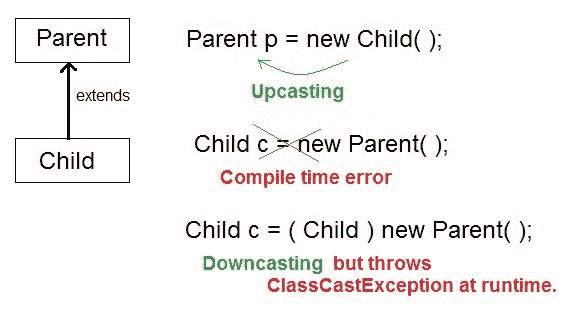Java instanceof运算符和向下转换
原文:https://www.studytonight.com/java/instanceof-operator.php
在 Java 中,的instance 是一个运算符,用于检查对象引用。它检查对象的引用是否属于提供的类型。它返回真或假,如果对象引用是指定的类型,则返回真或假。
我们可以使用 instanceof 运算符来检查对象引用是属于父类、子类还是接口。
它也被称为类型比较运算符,因为它将实例与类型进行比较。
实例的应用
除了测试对象类型,我们还可以将其用于对象向下转换。然而,我们可以使用类型转换来执行向下转换,但是它可能会在运行时引发 ClassCastException。
为了避免异常,我们使用 instanceof 运算符。这样做有助于执行铸造。
当我们进行类型转换时,检查类型转换是否有效总是一个好主意。instanceof 在这里帮助我们。我们总是可以首先使用 instanceof 检查有效性,然后进行类型转换。
下面给出了声明 instanceof 运算符的语法。
语法
(object) instanceof (type)
对象:是对象引用变量。
类型:可以是类,也可以是接口。
举个例子
我们举个例子来了解一下instanceof运算符的用法。这里我们测试的引用类型是 Test 类的类型,它返回 true。
public class Test
{
public static void main(String[] args)
{
Test t = new Test();
System.out.println(t instanceof Test);
}
}
真实的
示例:接口引用类型
让我们使用 instanceof 运算符创建一个接口并测试引用类型。如果引用对象引用了正确的接口类型,则该运算符返回。见下面的例子
interface Callable{
void call();
}
class Demo implements Callable {
public void call() {
System.out.println("Calling...");
}
public static void main(String[] args) {
Callable d = new Demo();
// Refer to a class
System.out.println((d instanceof Demo));
// Refer to an interface
System.out.println((d instanceof Callable));
}
}
真实真实
如果引用变量保持为空,则实例返回假。让我们再看一个例子。
class Demo {
public static void main(String[] args) {
Demo d = null;
System.out.println(d instanceof Demo);
}
}
错误的
示例:继承
让我们再举一个例子来理解运算符的实例,其中我们创建了 5 个类,其中一些扩展到了另一个类。现在通过创建对象,我们测试引用对象属于哪个类。
class Parent{}
class Child1 extends Parent{}
class Child2 extends Parent{}
class Demo
{
public static void main(String[] args)
{
Parent p =new Parent();
Child1 c1 = new Child1();
Child2 c2 = new Child2();
System.out.println(c1 instanceof Parent); //true
System.out.println(c2 instanceof Parent); //true
System.out.println(p instanceof Child1); //false
System.out.println(p instanceof Child2); //false
p = c1;
System.out.println(p instanceof Child1); //true
System.out.println(p instanceof Child2); //false
p = c2;
System.out.println(p instanceof Child1); //false
System.out.println(p instanceof Child2); //true
}
}
真真假假真真假假真真假假
Java 中的向下转换
向下转换是使用运算符的实例的优势之一。向下转换是在子类中持有父类的对象引用对象的过程。与上推相反,子代的对象分配给父代类引用对象。
然而,我们可以使用类型转换来执行向下转换,但是它会在运行时抛出类转换异常。所以为了避免这个,我们使用 instanceof 运算符来执行向下转换。
你可以通过下图了解整个过程。

使用instanceof运算符向下转换的示例
**class Parent{ }**
public class **Child** extends **Parent**
{
public void check()
{
System.out.println("Sucessfull Casting");
}
public static void show(Parent p)
{
if(p instanceof Child)
{
Child b1=(Child)p;
b1.check();
}
}
public static void main(String[] args)
{
Parent p=new Child();
Child.show(p);
}
}
成功完成铸造